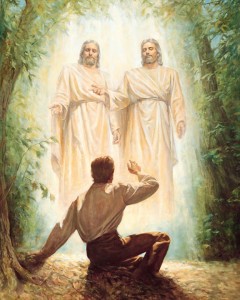The Mormon Church began with the First Vision. This is what we call the marvelous event where, in response to prayer, the Father and the Son appeared to the fourteen year-old Joseph Smith. Even though he had this vision in seclusion, it really belongs to everyone.
 I say that because the First Vision means so much to me. It nails down so many—if not all—of my basic beliefs.
I say that because the First Vision means so much to me. It nails down so many—if not all—of my basic beliefs.
The first belief is God’s existence. Roman Catholic philosopher Peter J. Kreeft said:
“The question of whether God really exists is obviously one of the most interesting and important questions in the world for most people, especially for most philosophers. For God’s existence or nonexistence makes a difference to everything . . .” (The Philosophy of Tolkien: The worldview behind The Lord of the Rings, 50)
For me, the First Vision settles that question. God the Father and His Son Jesus Christ appeared to the teenage Joseph Smith. He saw, They spoke with him, and he knew beyond a doubt that They were real.
I also learn about the nature of God. The Father and the Son are two separate beings. Joseph Smith said, “I saw two personages.”(JS-H 1:17, 25) I mention this not to offend other’s beliefs, but to explain what we believe. Mormons do not believe in the Trinity. I have two friends—one a former Protestant, the other a former Roman Catholic—who left their denominations precisely because they did not understand the Trinity.
One of the leaders of the Mormon Church, Elder Jeffery R. Holland said:
“Our first and foremost article of faith in The Church of Jesus Christ of Latter-day Saints is ‘We believe in God, the Eternal Father, and in His Son, Jesus Christ, and in the Holy Ghost.’ We believe these three divine persons constituting a single Godhead are united in purpose, in manner, in testimony, in mission. We believe Them to be filled with the same godly sense of mercy and love, justice and grace, patience, forgiveness, and redemption. I think it is accurate to say we believe They are one in every significant and eternal aspect imaginable except believing Them to be three persons combined in one substance, a Trinitarian notion never set forth in the scriptures because it is not true.” (Jeffrey R. Holland, “The Only True God and Jesus Christ Whom He Hath Sent,” Ensign, Nov 2007, 40–42.)
A third thing I learn from the First Vision is the importance and significance of faith. (“Faith,” True to the Faith, (2004),54–56.)
Joseph Smith had faith, and he exercised faith. He read the passage in the Bible, “If any of you lack wisdom, let him ask of God, that giveth to all men liberally, and upbraideth not; and it shall be given him” (James 1:5) And then he then acted upon what he had read. Obedience is so simple!
A fourth thing is that God answers prayers. It is one thing to believe that God exists, but if He is ignoring us, then does it actually matter that He exists? Joseph Smith’s experience shows that God cares for us. He loves us to the point where He will talk to us and answer our questions.
A fifth thing is that Jesus Christ’s Atonement is real. Christ’s Atonement is His sacrifice for us; His suffering and death, burial, and resurrection. This, in part, motivated Joseph Smith to pray.
He explained:
“Thus from the age of twelve years to fifteen I pondered many things in my heart concerning the situation of the world of mankind … My mind become exceedingly distressed for I become convicted of my sins … I felt to mourn for my own sins and for the sins of the world.”
He went into a neighboring grove of trees and prayed. Joseph Smith continues:
“[I saw] a pillar of fire light above the brightness of the sun at noon day come down from above and rested upon me. I was filled with the spirit of God and the Lord opened the heavens upon me, and I saw the Lord.
“He spake unto me saying, “Joseph, my son, thy sins are forgiven thee. Go thy way, walk in my statutes and keep my commandments.” (1832 History, in Personal Writings of Joseph Smith, 2nd ed., 9-14, standardized)
Desiring to belong and to know our status before God I think underlies much of what we do. It certainly motivated Joseph Smith to take action. The good news is that he did find reunion with God.
Sixth, I learn that Joseph Smith was a real person with real problems. As I read and reread his account, I am impressed how straightforward—even down-to-earth—his statements are. I think that at times, we all feel the same way that he did.
Joseph Smith was a teenager, and he was confused by things. He also had an honest desire to do the right thing, but did not know what to do. He was a bit like James Dean’s character Jim Stark in Rebel Without A Cause. Stark gets into an argument with his parents, and then things erupt. Stark finally yells, “You, you say one thing, he says another, and everybody changes back again!”
Joseph Smith felt the same way. But instead of blowing up at people and drag-racing, he turned to the scriptures and prayer. The good news is that we all can do this, whether we are in the nineteenth century or the twenty-first. No matter what, they are always available.
About kendalbhunter
Twitter •



